As businesses expand, technology management can become overwhelming. Systems start to slow down with increasing data, software integration becomes more complex, and cybersecurity risks demand more attention. You might realize you need professional oversight, but hiring a full-time CTO can be costly. Fractional CTO jobs offer the perfect solution by delivering technical leadership and expertise without the hefty cost.
At Aloa, we take pride in helping businesses and startups overcome challenges through our professional network of highly vetted partners. As a trusted software agency, we deeply understand the complexities of hiring and can connect with a highly skilled fractional CTO who can bring expertise and strategic vision.
With our best practices in software outsourcing, we’ve created a comprehensive overview of the role of a fractional CTO. We’ll discuss why companies prefer them and the advantages of choosing a part-time over a full-time tech executive. By the end, you’ll understand how flexible they are in driving innovation and streamlining operations in your company without the long-term commitment.
Let’s get started!
Understanding the Fractional CTO Role
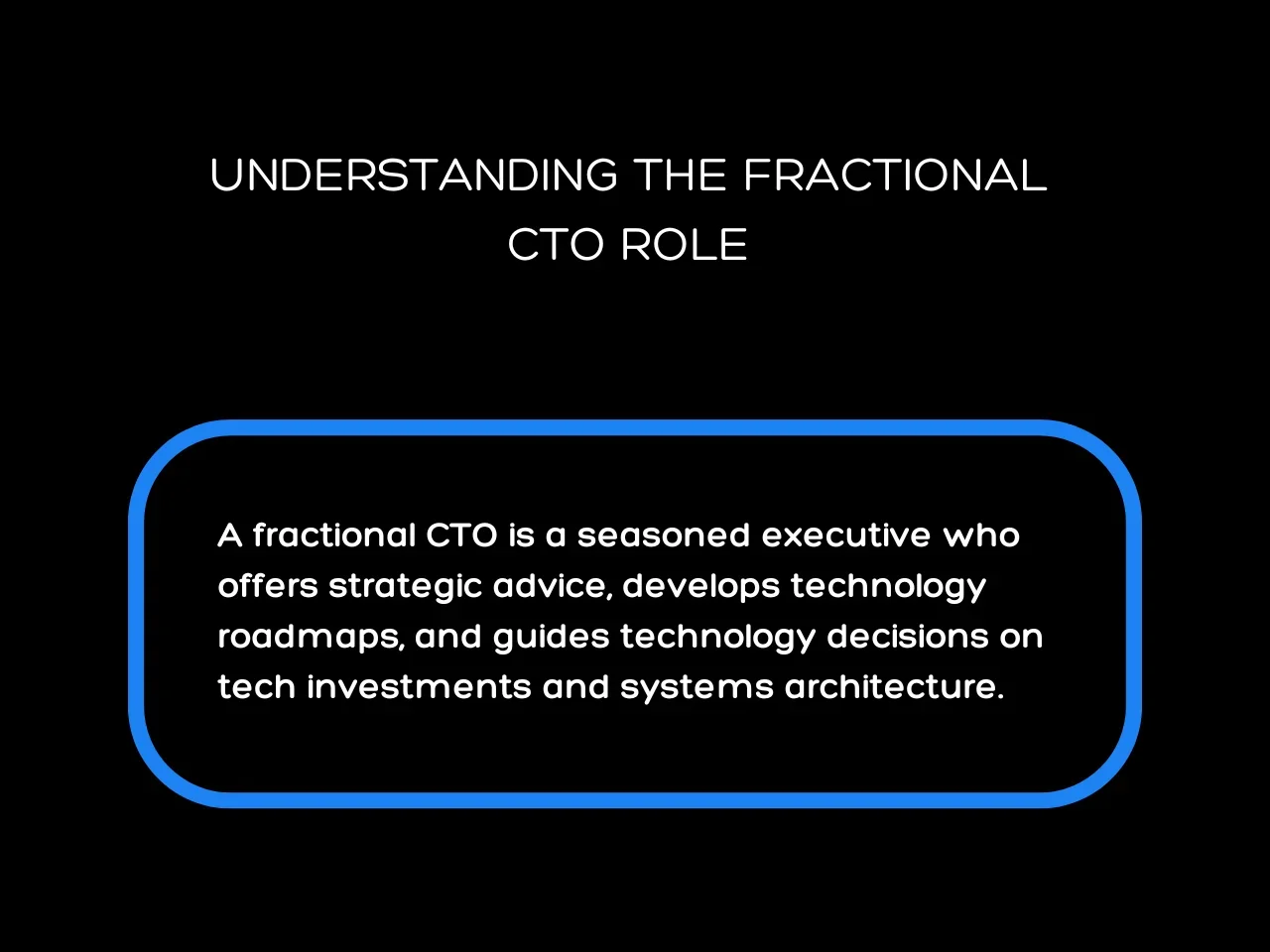
A fractional CTO is a seasoned executive who offers strategic advice, develops technology roadmaps, and guides technology decisions on tech investments and systems architecture. Companies benefit from this role because they can access high-level guidance remotely or on-site at a fraction of the cost.
Defining the Fractional CTO Position
Fractional CTOs work with a company for a portion of the year on a contractual basis and usually serve multiple clients simultaneously. A startup can hire a fractional CTO to develop a technology roadmap for its initial product launch. At the same time, a larger corporation can use one to oversee a major digital transformation project.
In terms of strategic leadership, fractional CTOs are responsible for technology strategy, digital transformation, and innovation. They assist a company in integrating new cloud solutions to enhance scalability or advise on adopting advanced cybersecurity measures.
Comparing Fractional, Interim, and Full-Time CTOs
Fractional, interim, and full-time CTOs significantly differ in engagement, duration, and responsibilities. Let’s explore how each role differs:
Fractional CTO
A fractional CTO is ideal for startups and smaller companies that need tech expertise without the cost of a full-time hire. They usually work about 10 to 25 hours weekly, mentoring in-house teams and focusing on specific tech challenges and projects. Depending on your specific needs, you can partner with them for several months to over a year.
Interim CTO
Interim CTOs work either full-time or part-time for 6 to 12 months. They fill leadership gaps during transitions or while searching for a permanent CTO, managing daily tech operations and overall strategy. Companies experiencing sudden departures of their CTO can benefit from interim CTOs. However, they have higher rates than fractional CTOs.
Full-Time CTO
A full-time CTO is a permanent executive responsible for the overall technology strategy and company operations. Their role is most effective for large enterprises with complex, ongoing tech needs, companies where technology is central to their business model, or organizations needing constant presence and hands-on management.
Critical Skills and Qualifications of a Fractional CTO
A fractional CTO needs strong skills and qualifications to tackle complex challenges efficiently during limited hours. Look for the following skills and qualifications when seeking a fractional CTO:
Critical Skills of a Fractional CTO
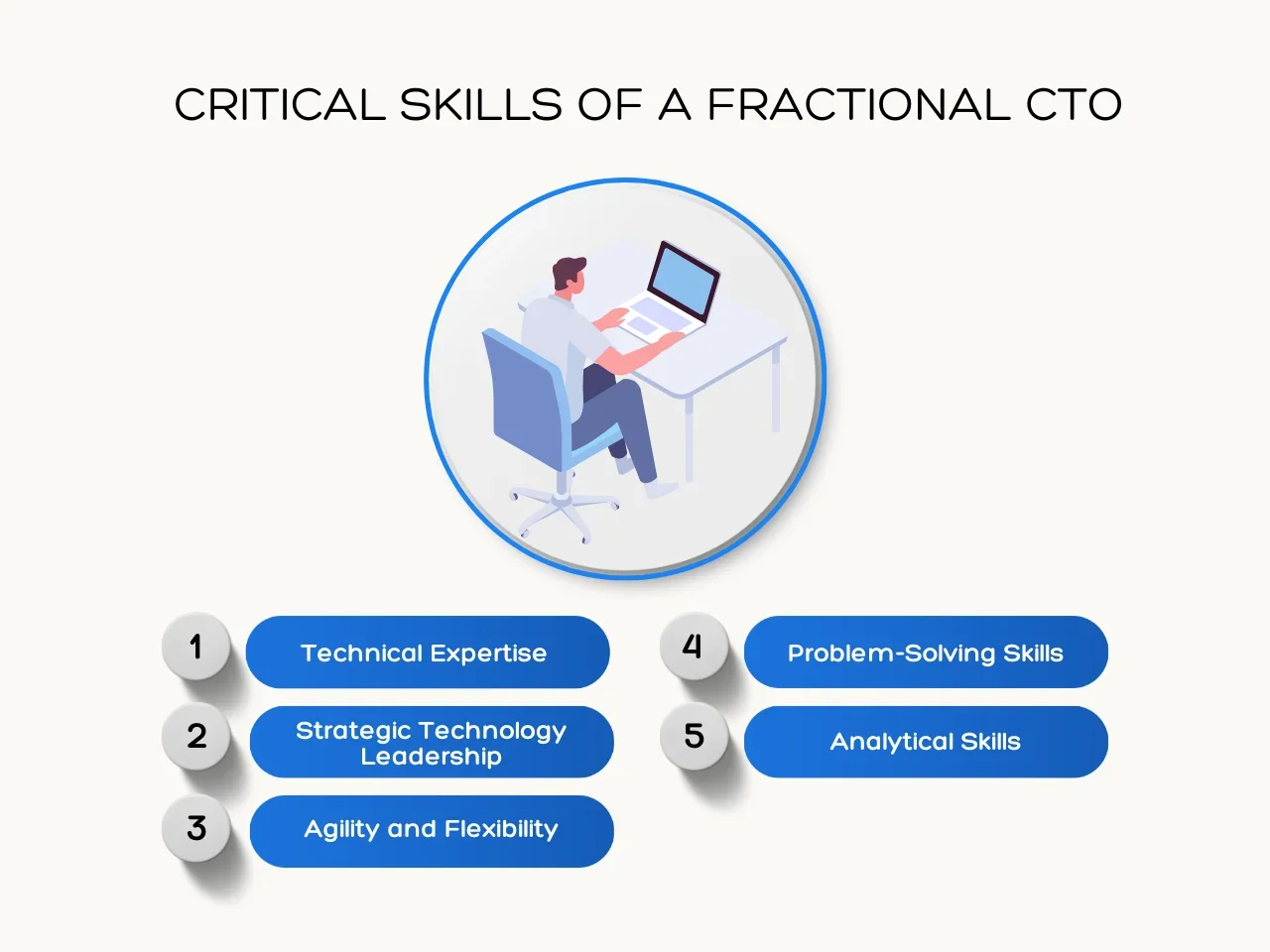
- Technical Expertise: Possesses deep knowledge of software development, tech stacks, and data security. They have experience across various programming languages and platforms.
- Strategic Technology Leadership: Leads technology teams, manages projects, and communicates effectively with all levels of the organization.
- Agility and Flexibility: Adapts to the changing market standards and stays attuned to the current demands of the industry.
- Problem-Solving Skills: Effectively identifies and resolves technology challenges to minimize potential risks, such as system outages and security breaches.
- Analytical Skills: Identifies problems that could impact business performance and pinpoints inefficiencies in workflow, processes, and systems through data collection, investigation, and forensic analysis.
Qualifications of a Fractional CTO
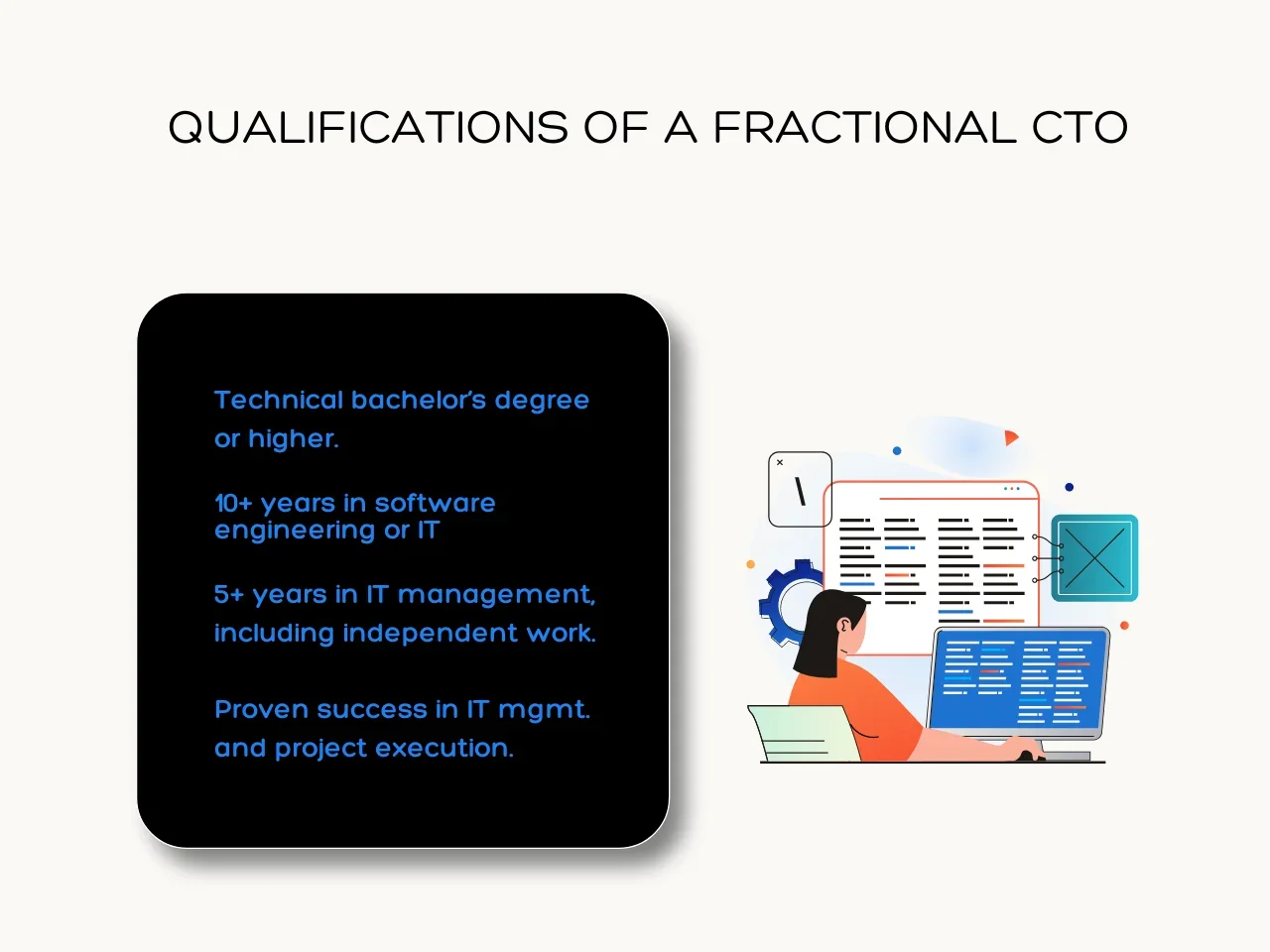
- Education: A bachelor’s degree or higher in a technical field like computer information science, project management, or computer engineering.
- Experience: At least 10 years of experience in software engineering or IT, with a minimum of five years in an IT management role, ideally with independent work experience.
- Proven Success: Must have a track record of success in IT management and project execution across various companies.
The Strategic Advantages of Hiring a Fractional CTO
As a company evaluating the need for fractional CTO services, it’s important to understand the strategic advantages of hiring one, from accessing expertise to enhancing team performance:
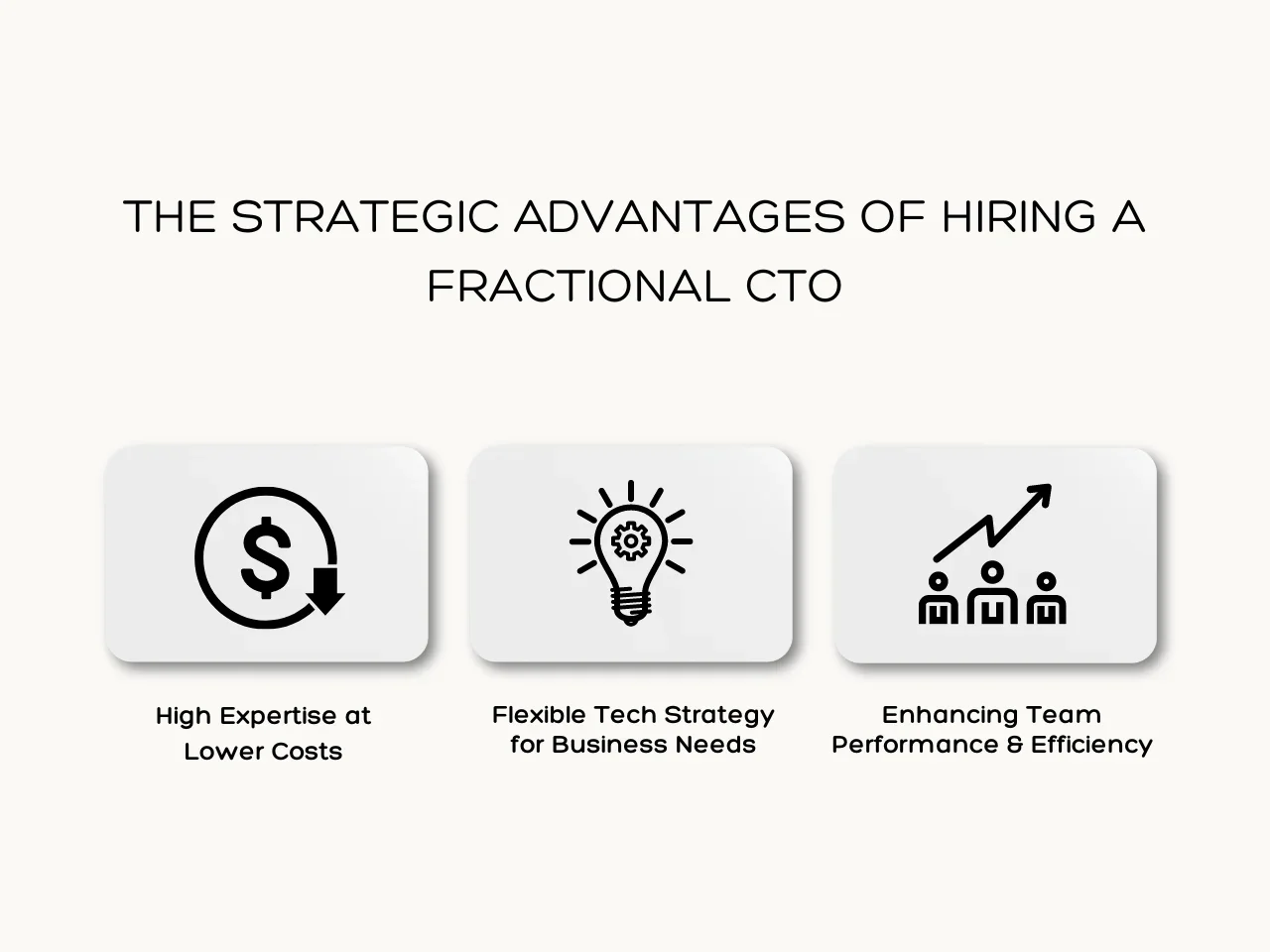
Access to a High Level of Expertise at Reduced Costs
Fractional chief technology officers provide high-level expertise at a reduced cost compared to full-time ones, who charge hourly or per project. This way, companies can access expert tech and strategic guidance at affordable rates instead of a six-figure salary. Also, organizations can avoid extra expenses like benefits and stock options. As the company grows, it can increase the CTO’s hours or switch to a full-time position if necessary.
Flexibility to Scale Technology Strategy with Business Needs
Another key benefit of hiring a fractional CTO is the flexibility to scale technology with business needs. Fractional CTOs can quickly evaluate and update a company’s tech setup to align with new business goals.
For example, if a company wants to enter e-commerce, a fractional CTO can create a detailed product roadmap to implement the needed platforms, integrate smoothly with CRM and inventory systems, and tackle challenges like handling high transaction volumes and ensuring fast load times during busy periods.
Moreover, fractional chief technology officers excel at balancing short-term technological needs with long-term strategic vision. They use agile methodologies to enable rapid iterations and adjustments for businesses, especially where market conditions and customer demands can change overnight. For instance, they can apply various strategies to scale IT operations according to project requirements and budget constraints.
Learn some examples of how scaling can be achieved:
- Cloud Infrastructure: Leverage cloud services to quickly scale computing resources up during peak demand periods and scale down during lulls to optimize costs.
- Outsourcing: Engage external development teams for specific projects to rapidly scale the workforce without long-term commitments.
- Automation: Implement automated testing and deployment processes to handle more workloads without hiring more employees.
- Microservices Architecture: Adopt a microservices approach to independently scale different application components based on demand.
- Managed Services: Utilize managed IT services to scale support and maintenance capabilities flexibly as needed.
- Agile Project Management: Employ agile methodologies to adjust project scope and resource allocation in response to changing priorities and budgets.
Enhancing Team Performance and Efficiency
A fractional chief technology officer brings expertise to mentor and develop internal tech teams. They identify skill gaps, create tailored training programs to upskill team members, and act as a board to guide internal team members on complex technology issues.
Aside from mentoring, fractional CTOs streamline processes and boost productivity by implementing automation tools, optimizing deployment processes, introducing infrastructure as code (IaC), and continuous integration/continuous delivery (CI/CD) pipelines to reduce manual errors and accelerate software delivery.
Furthermore, they foster innovation and drive progress by introducing new technologies and methodologies and establishing interactive feedback loops with users to promote continuous product improvement. They can inspire creative problem-solving and innovation by encouraging experimentation and calculated risk-taking.
Key Responsibilities of a Fractional CTO
Fractional chief technology officers are responsible for steering technology strategy and guiding technical teams. However, here are the key roles that they should be aware of:
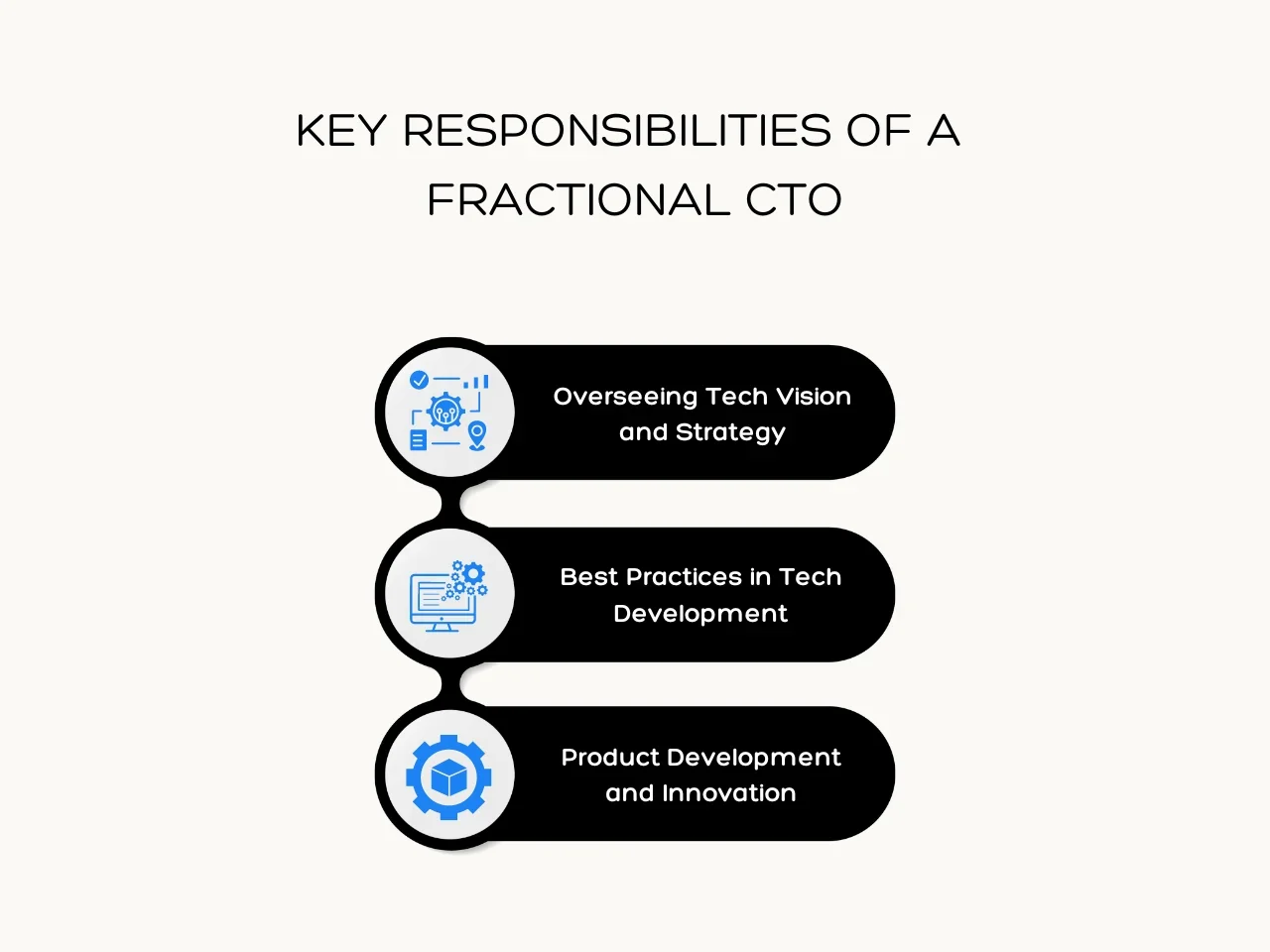
Overseeing Technology Vision and Strategy
Fractional CTOs use their extensive experience and industry knowledge to offer insights into emerging trends and technologies. They work closely with executives to ensure technology decisions support the company’s long-term objectives and drive innovation.
One of their key responsibilities is conducting thorough technology assessments. This starts with evaluating existing infrastructure, systems, and processes to determine strengths, weaknesses, and opportunities for optimization. Based on these assessments, they develop a strategic technology roadmap detailing priorities, timelines, and resource requirements for implementing or upgrading new solutions.
For example, if a company’s IT infrastructure is outdated and can no longer support new software applications, a fractional CTO can assess the current systems, identify bottlenecks, and propose a phased upgrade plan. They could also recommend migrating to cloud-based solutions to enhance scalability and efficiency and create a transition timeline to avoid disrupting ongoing operations.
Implementing Best Practices in Technology Development
Fractional chief technology officers ensure that industry best practices for software development processes and IT management are adopted and maintained. Here’s how they can achieve this:
Establish Development Standards
- Consistent Coding Conventions: Ensures everyone follows the same coding styles and documentation practices.
- Agile Methodologies: Adopts frameworks like Scrum or Kanban to boost efficiency.
Aligning Technology with Business Goals
- Technology Roadmap: Develops a plan that aligns with the company’s strategy.
- Performance Measurement: Uses KPIs to track how technology performance aligns with business goals.
Implementing Security Best Practices
- Security Audits and Penetration Testing: Regularly checks for vulnerabilities.
- Incident Response Plans: Prepares for and manages potential security breaches.
Guiding Product Development and Innovation
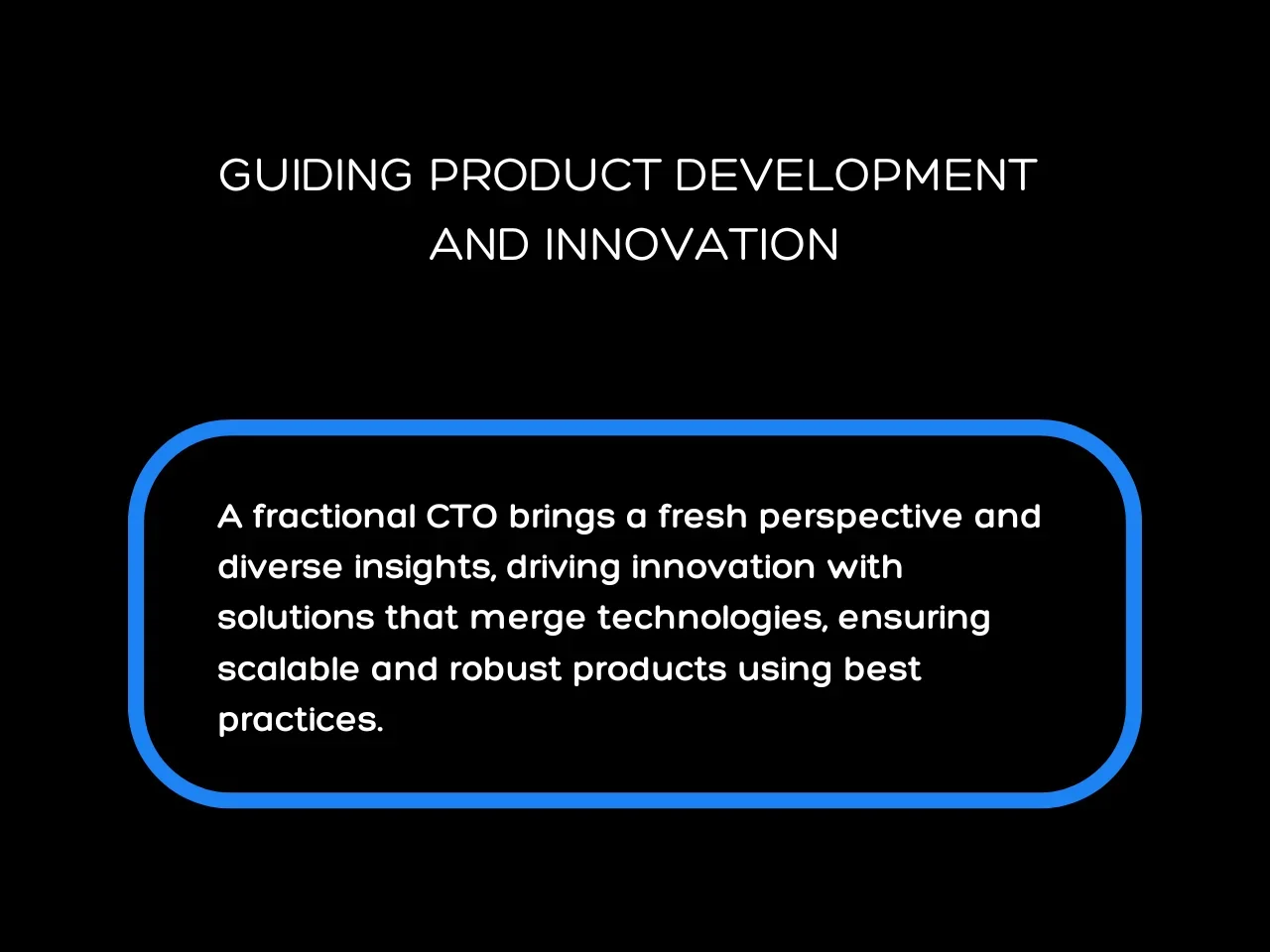
Having a fractional CTO is advantageous for any company because of their fresh perspective. They have experience from various industries, offering a wealth of knowledge and diverse insights that can drive innovation.
For example, a fractional chief technology officer with a background in fintech and healthcare can introduce innovative solutions that merge secure payment systems with patient data management, offering innovative ways to both sectors. This fresh outlook can shorten the learning curve and accelerate the development and execution of technology strategies, resulting in a quicker time to market new products or services.
In industries where technological advancement, cross-functional collaboration, and operational efficiency are critical, these leaders can ensure your products are scalable, robust, and developed using best practices. For instance, in a fast-paced e-commerce environment, a fractional CTO can implement agile methodologies and cloud solutions to ensure the platform can handle increased traffic and scale seamlessly during peak shopping seasons.
Key Takeaway
Fractional CTOs can be valuable assets for startups and small to medium-sized businesses. They provide expertise and strategic guidance without the high cost of hiring a full-time executive, allowing smaller companies to adapt to market changes and grow sustainably in their early stages.
However, finding the right fractional CTO comes with its own set of challenges. Integrating them into your daily operations may require significant effort. It’s important to remember that not all fractional CTOs are the same, and their impact largely depends on how well they integrate into the team.
Looking for a fractional CTO for your business? Aloa provides a product owner who acts as a fractional CTO when you start a software engagement with us. Once the project begins, this product owner, already familiar with the development team’s operations, can align your goals with the best development practices. Contact us at [email protected] to explore your options for solving complex technical challenges and driving sustainable success.

